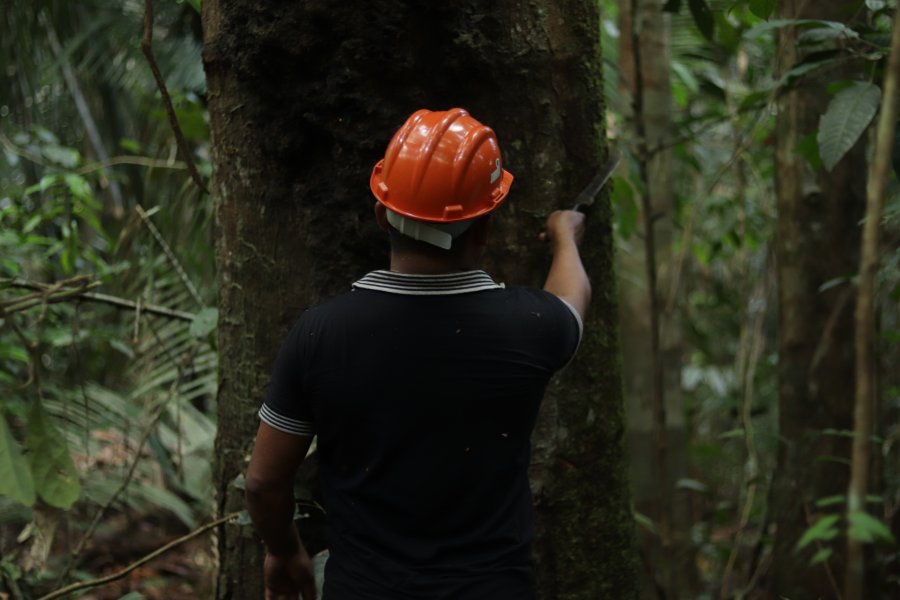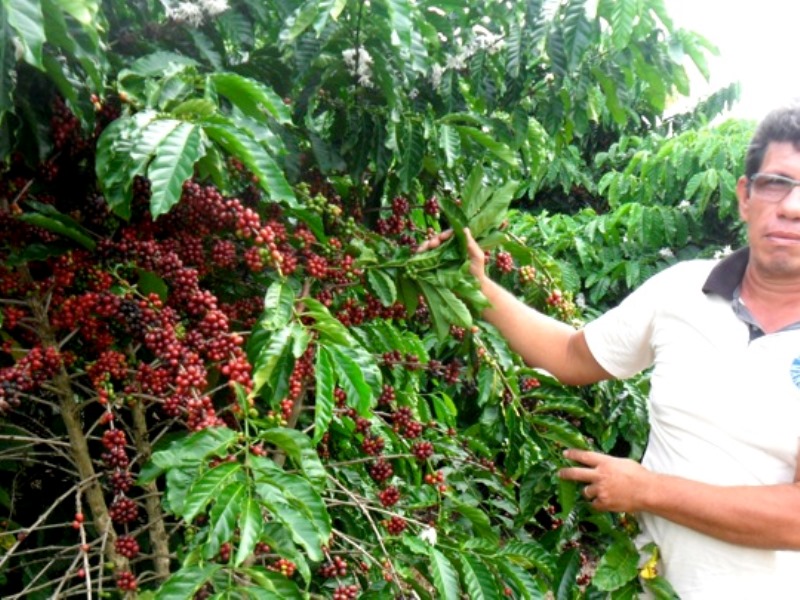
Mulheres e jovens que produzem Café Apuí Agroflorestal recebem treinamento por videoaulas
Ministrada de maneira remota às mulheres e jovens cafeicultoras, série está disponível no YouTube
Texto e foto por Henrique Saunier
A importância da presença feminina em setores estratégicos da agricultura familiar e os cuidados necessários para a manutenção da certificação orgânica são os principais temas da série de videoaulas que o Idesam lança, produzidas especialmente para 18 famílias agricultoras parceiras da iniciativa Café Apuí Agroflorestal. Com foco nas mulheres cafeicultoras do sul do Amazonas, as videoaulas serão ministradas remotamente, via tablets disponibilizados pelo projeto.
Localizada em Apuí/AM, a Associação de Produtores Familiares Ouro Verde (APFOV) desenvolve o projeto de café em agrofloresta desde 2012, com assessoria técnica do Idesam. Essas famílias cultivam o café conillon (ou sombreado) em sistemas agroflorestais (SAFs), com o uso de técnicas de manejo orgânico. Introduzidos com o apoio de técnicos do Idesam, os SAFs recompõem a paisagem florestal, aliando a conservação ambiental da Amazônia com o desenvolvimento social para as famílias.
A iniciativa de produzir o conteúdo digital para oferecer treinamento a essas famílias parceiras foi possível graças ao apoio do projeto Mercado Verdes e Consumo Sustentável, desenvolvido pela Agência Alemã de Cooperação Internacional (GIZ) em parceria com o MAPA, com o apoio do Consórcio Eco Consult/Ipam.
“Este é um grande passo para capacitar principalmente mulheres e jovens na cadeia de valor do café em Apuí. Esse projeto nasceu para replicar a metodologia de análise de gênero em cadeias de valor, um dos módulos do Programa CapGestão Amazônia. Estamos muito contentes com os produtos desenvolvidos pelo projeto e esperamos que as famílias agricultoras de Apuí ampliem o conhecimento das relações de gênero envolvidas na produção de café agroflorestal e ampliem a certificação participativa orgânica do café”, ressalta Cláudia de Souza, coordenadora do Programa CapGestão Amazônia.
O grupo de agricultoras que recebeu a qualificação em vídeo atualmente está em seu segundo ciclo da certificação orgânica participativa, o que requer alto grau de organização social para garantir com segurança a conformidade orgânica dos produtos. No entanto, o trabalho em grupo e a autogestão do empreendimento ainda são desafios para o crescimento do grupo, daí a estratégia de capacitar e empoderar as mulheres e jovens em geral.
“Com oito anos de existência, em 2018 o projeto atingiu a certificação orgânica, porém necessita de investimentos para se consolidar e expandir sua escala produtiva, a fim de acessar o mercado de cafés especiais e garantir um ciclo positivo e sustentável de crescimento ao empreendimento”, destaca Marina Reia, coordenadora de projetos que atua diretamente com produtores de Apuí.
Segundo Reia, iniciativas como essa da série de videoaulas contribuem com a expectativa de alcançar a meta de até 2020 conseguir certificar como orgânicos todos os produtores do projeto Café Apuí Agroflorestal. “O grupo entende que acessar o Selo Orgânico Brasil dessa forma (de maneira participativa), além de ser viável economicamente para os produtores, mantém a organização social coesa e é também vantajosa porque podem envolver jovens e mulheres nas atividades de registro. E com isso, certificar mais itens da propriedade, gerando mais oportunidades de crescimento econômico e social e envolvendo mais famílias”, completa Marina Reia, que também é a instrutora das cinco videoaulas disponibilizadas.
Sobre o Café Apuí Agroflorestal
Apuí se localiza no extremo sul do AM, atual frente do desmatamento da Amazônia. O principal motivo de grilagem de terras públicas e desmatamento ilegal reside na pecuária extensiva, onde cerca de 90% da área desmatada no território é convertida em pastagens. Nesse contexto, o Café Apuí Agroflorestal se posiciona como uma alternativa para propagar e consolidar modelos econômicos que estejam em harmonia com a ecologia e povos locais, assim como serem passíveis de replicação no bioma.
Atualmente disponível também em uma versão orgânica, o Café Apuí Agroflorestal é cultivado de maneira consorciada com árvores nativas de interesse econômico e alimentar das famílias. A conversão de áreas improdutivas para áreas florestadas também gera uma produtividade 60% superior dos cafezais em relação ao cultivo convencional.










